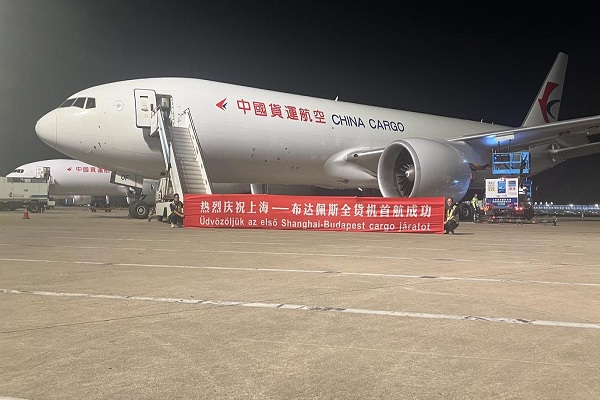Baoshan looks to transform into technology hub
Key innovative area of Shanghai hopes emerging industries can attract greater overseas investment
Shanghai's Baoshan district is on its way to transforming into a technology hub with a strong appeal to global investors.
In the northern part of Shanghai, Baoshan district is located at the confluence of the Huangpu River and the Yangtze River.
The district has long been a traditional heavy industry base, home to Baosteel Group, one of China's largest modern iron-steel enterprises, and hundreds of other metallurgy and chemical plants with a history dating back to the 1930s.
"Over the years, Baoshan has formed a solid foundation for industrial development. With the development of society and the change of the economic environment, we are positively looking for new growth through promoting industrial transformation," said Chen Yaoshui, deputy chief of Baoshan district.
Chen said the district is in a clear position to build itself into a science and technology innovation hub for the industrialization of high-tech projects.
And it has listed biomedicine, new materials, robotics and intelligent equipment, electronic information and the marine economy as its key industries for future development.
So far, Nanda and Wusong are the two major areas in the district that have implemented its industrial transformation strategy.
With artificial intelligence a key component of future smart cities, Nanda is developing intelligent manufacturing capabilities.
In the future, the Nanda area is expected to develop environmentally friendly high-tech parks for AI, the internet of vehicles and other high-tech industries.
The former site of the city's iron and steel industry is to become a part of a smart city featuring scientific innovation, commerce and tourism.
The Wusong area, which is home to the renowned Baosteel Group, and known as the cradle of China's modern industry, also plans to become a crucial part of the smart city.
In the future, Wusong will feature new materials and hardware industries and scientific and cultural innovation parks as well as a number of commercial and business facilities. Residential communities and waterfront attractions are also planned.
Complete facilities
To promote the transformation and support the development of key industries, Baoshan district has established a number of industrial parks and zones, such as Shanghai Industrial Park of Robotics, Shanghai Super Science and Innovation Park and North Shanghai Biomedical Industrial Park.
Meanwhile, it also offers financial support for enterprise development, technology upgrades, innovation and talent attraction.
Chen emphasized that all the foreign-funded businesses in Baoshan enjoy the same treatment as their Chinese peers.
"All the policies and regulations as well as financial support in our district are implemented on an equal basis," Chen said.
"Supportive policies for industrial development are equally available for both foreign-funded and domestic enterprises in Baoshan district."
The district has placed great emphasis on services for foreign-funded enterprises.
For example, it has established a business assistance system to provide professional services for enterprises.
And there is a 100-person team to provide one-to-one tailored assistance and follow-up services.
They provide policy guidance for enterprises according to their different situations, such as enterprise registration; foreign exchange, import and export; construction of headquarters and research and development centers; and technology transformation projects, so as to help enterprises improve efficiency.
In addition to conducting regular visits and discussions with key enterprises, it has also built a communication platform to help enterprises solve problems efficiently and effectively.
Officials also participate in services in person for key areas and key industrial enterprises, aiming to build Baoshan into a favored investment destination.
After the outbreak of COVID-19 earlier this year, the district's officials immediately contacted enterprises to learn about their difficulties and provide solutions.
As a result, a number of foreign-funded enterprises have expanded their development in Baoshan. Fortune Global 500 enterprises, such as Fanuc, Yaskawa Electric, Siemens and Toshiba, have invested in more than 20 projects in Baoshan, according to the district government.
A number of globally leading enterprises with independent R&D and innovation capabilities are also gaining new growth in Bashan, such as Optorun, Carl Schenck, Fronius International and Lincoln Electric Holdings.
Currently, Baoshan is home to 13 headquarters and R&D centers of multinational companies.
Chen said foreign investment has played a significant role in the district's development, which had attracted 2,190 foreign-funded enterprises as the end of 2019.
Total industrial output value of foreign-funded enterprises reached 44 billion yuan ($6.7 billion) in 2019, accounting for 20 percent of the district's total, and tax revenue of foreign-funded enterprises amounted to 4.66 billion yuan, accounting for 11.3 percent of the district's total.
Foreign-funded enterprises have a combined payroll of 39,100 people, accounting for 13.7 percent of the total employment in the region.
At the third China International Import Expo held in Shanghai earlier this month, the total volume of purchase transactions from Baoshan continued to increase.
Officials said the district will take advantage of the spillover effect of the annual event to attract more foreign investment.

